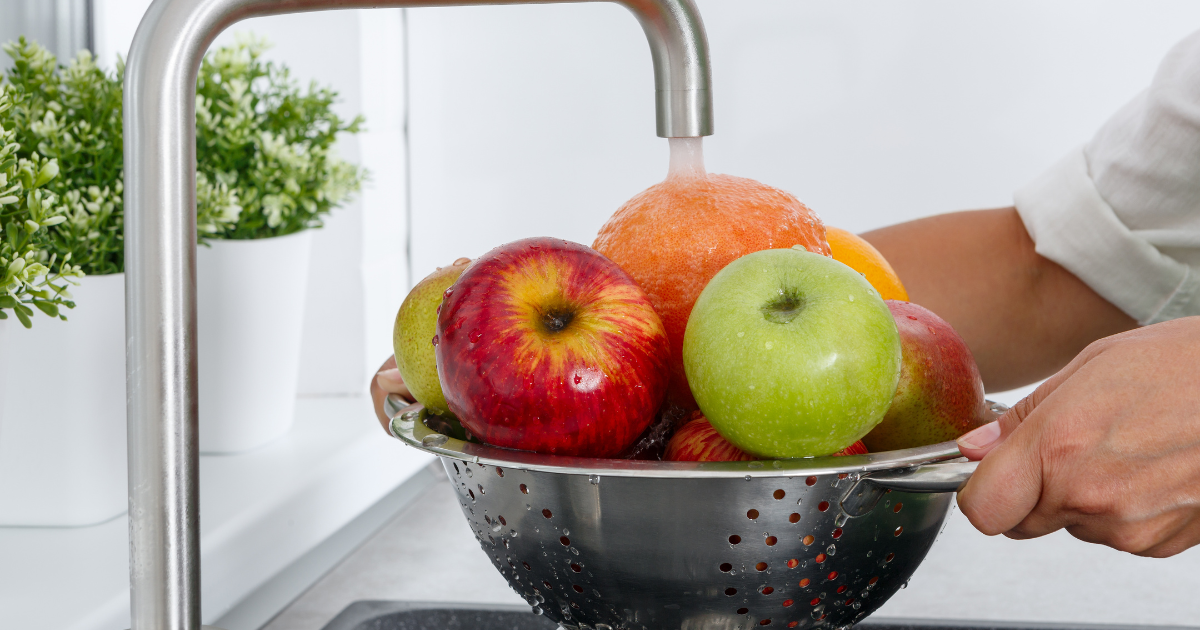How to Wash Fruit Properly

We have always known that it is important to clean fruits and vegetables properly before consuming them. It is an important part of our everyday hygiene. However, ever since the outbreak of the COVID-19 pandemic, there has been quite a buzz over cleaning food items thoroughly, considering the number of hands it got transferred to and fro.
According to the WHO, foodborne illnesses are on the rise for the last few years. The dirt, bacteria and other germs in fruits & vegetables can cause severe ailments like dysentery, stomach and throat infections, flu, nausea, allergies and more. The pandemic has taught us to be more thorough while cleaning food items, especially fruits & vegetables. However, are we all following these cleaning tactics as vigorously as we used to do in the early part of 2020 when COVID infections were at their peak? The answer is a big no.
Listed below are some strict cleaning tips that we all need to follow, before consuming fruits. This has to be part of our daily routine, if we want to safeguard ourselves and our loved ones from foodborne illnesses.
Is water enough for cleaning fruits properly?
For many centuries now, you have been washing fruits with water before eating. However, the pandemic has made you doubt this too, along with many other things. You would definitely agree with us when we say that all of us became extra cautious, at least in 2020 and 2021, when it came to cleaning our fruits and vegetables.
Some started recommending using soap & water, while some other brands launched their own food-safe cleaners. We also heard a few recommendations that included using lemon juice, vinegar, bleach and many more agents for cleaning fruits before consuming them. It was considered that washing fruits in plain water was not enough to get rid of the tough germs that had been collected in them.
The FDA (Food and Drug Administration) and the CDC (Centers for Disease Control) had to intervene and advise people against the use of harsh chemicals and bleach for cleaning food items. Cleaning agents, especially bleach, could leave behind harmful residues and deposits on the fruits, which was toxic for the body.
The conclusion – Yes, washing fruits in plain, cool water is more than enough for cleaning fruits. However, if you want to go the extra mile in cleaning fruits, you can use a neutral solution for cleaning (like electrolyzed water) or a toxic-free cleaning agent (like baking soda) to get rid of the heavy mud particles, dirt and germs in the fruits.
How to use baking soda to clean fruits
- Clean your hands thoroughly before proceeding to wash the fruits, so that the dirt and germ from your hands don’t get transferred to the fruits. Use soap and warm water to wash your hands thoroughly for 20 seconds.
- Where do you plan to soak the fruits before washing them? If you have a lot of fruits to wash, you may consider soaking them in a kitchen sink. Else, you can use a bowl for this purpose. Whatever you choose (bowl or sink), you need to sanitize and clean it first.
- Fill almost 60 to 70% of the tub or bowl with cold water. Add 3 to 4 tablespoons of baking soda to this, and mix the contents well.
- Soak the fruits well in the solution of baking soda and water in such a way that the fruits are submerged thoroughly.
- Let it soak there for about 15 minutes. Keep swishing the fruits inside the baking soda solution so that you wash the fruits thoroughly.
- For soft fruits like grapes, use your fingers to rub over them, and get rid of dust, wax, or other dirt particles on their skins. However, for hard fruits like apples, melons and more, you can use a soft-bristled toothbrush to clean the residues.
- Take out the fruits from the bowl, and use a soft & clean cloth to wipe them thoroughly. Let it dry for a while, after which you can consume them, or use them for prepping your salads and more.
Can you use vinegar to wash fruits?
You might have heard many people telling you that vinegar is a great option to get rid of the dust and germs in fruits. Can you trust this fact? Well, while vinegar does help in removing stains and cleaning purposes, it is not a good idea to use it for washing fruits. Mixing some vinegar to a bowl of cold water, and using his solution to clean fruits may help to get rid of bacteria and germs in the fruits. However, cleaning with vinegar may leave an unusual taste behind on the fruits, much to your dislike. Also, when cold water can do the job of getting rid of bacteria from fruits very well, we don’t think you need to use any other external agents, including vinegar, to wash fruits.
Some generic tips to keep in mind
- The toxins present in the soil or water where the fruits grow can make them get contaminated easily. These fruits also get transferred among many hands. Not much hygiene is followed when the produce is harvested, packed, and transported to stores before it finally reaches you. This is the case even with the so-called “organic fruits” that you buy at exorbitant rates. So, you have to wash all fruits (organic ones as well) thoroughly in cold water before using them.
- If the fruits are damaged, no amount of washing can make them safe for consumption. So, take extra care when buying fresh produce of fruits and vegetables. Check for bruises, damaged pieces, mold and other issues on them before buying. This will ensure that you get to enjoy all the nutrients that these fruits possess.
- Never use any chemical cleaners (even if they are advertised as food-safe), soaps, bleaches and the like for cleaning fruits. These chemicals contain toxins that are harmful to your health.
- It is better to wash fruits, even if you buy the pre-cut varieties. If you don’t plan to use them immediately, please put them away in the refrigerator after they dry.
